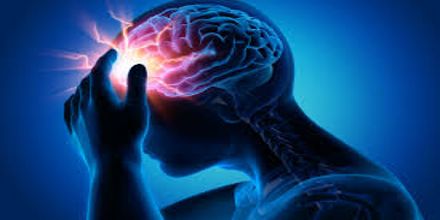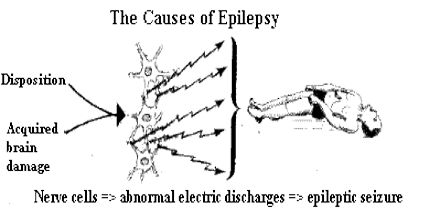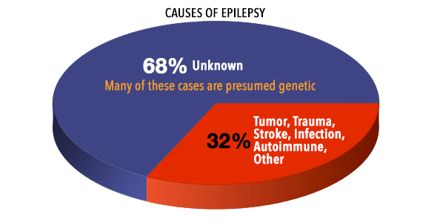Epilepsy is a neurological situation (affecting the brain and nervous system). Having epilepsy means that you be liable to have seizures that begin in the brain. Epilepsy is a group of related disorders characterized by a propensity for recurrent seizures. There are dissimilar types of epilepsy and seizures. Epilepsy drugs are prescribed to control seizures, and infrequently surgery is essential if medications are unsuccessful.
People with epilepsy tend to have recurrent seizures (fits). The seizures happen because of a unexpected surge of electrical activity in the brain – there is an overload of electrical activity in the brain. This causes a impermanent disturbance in the messaging systems between brain cells. During a seizure the patient’s brain becomes “halted” or “mixed up”.

Every function in our bodies is triggered by messaging systems in our brain. What a patient with epilepsy experiences during a seizure will depend on what part of his/her brain that epileptic activity starts, and how widely and quickly it spreads from that area. Accordingly, there are numerous types of seizures and each patient will have epilepsy in his/her own distinctive way.
Types of seizures
There are three types of diagnoses a doctor may make when treating a patient with epilepsy:
- Idiopathic – this means there is no apparent cause.
- Cryptogenic – this means the doctor thinks there is most probably a cause, but cannot pinpoint it.
- Symptomatic – this means that the doctor knows what the cause is.
Diagnosis and causes of epilepsy
A diagnosis of epilepsy may influence your life in assorted dissimilar ways, or not at all. You may wonder how your family and friends will respond, or how epilepsy might influence your daily life, leisure activities or your living arrangements. Some easy measures can help develop your safety at home and when you are out and about.

What causes epilepsy?
Causes of epilepsy differ by age of the person. Some people with no clear reason of epilepsy may have a genetic cause. But what’s true for each age is that the reason is indefinite for about half of everyone with epilepsy.
- Some people with no known reason of epilepsy may have a genetic form of epilepsy. One or more genes may source the epilepsy or epilepsy may be caused by the way some genes work in the brain. The relationship between genes and seizures can be extremely difficult and genetic testing is not available yet for many forms of epilepsy.
- Some young children may be born with a structural change in an area of the brain that gives rise to seizures.
- About 3 out of 10 people have a change in the structure of their brains that causes the electrical storms of seizures.
- People of all ages can have head injuries, though severe head injuries happen most often in young adults.
- In middle age, strokes, tumors and injuries are more common.
- About 3 out of 10 children with autism spectrum disorder may also have seizures. The exact reason and relationship is still not clear.
- Infections of the brain are also general causes of epilepsy. The initial infections are treated with medication, but the infection can leave scarring on the brain that causes seizures at a later time.
- In people over 65, stroke is the most common cause of new onset seizures. Other conditions such as Alzheimer’s disease or other conditions that affect brain function can also cause seizures.

How is epilepsy diagnosed?
Epilepsy is a propensity to have repeated seizures, so a single one-off seizure is not regularly classed as epilepsy. However it is recommended that any single suspected seizure is investigated by a doctor, as there may be different probable causes.
If you have had one or more seizures, your GP should refer you to a specialist. This will generally be a neurologist (a doctor who specialises in conditions of the brain and nervous system), or a geriatrician (or ‘care of the elderly physician’ – a doctor who specializes in the medical care of older people). Supremely this will be someone who also specializes in epilepsy.
Much of how epilepsy is diagnosed is based on finding out what happens during the unusual events you have had, so your specialist may ask you to describe in detail what happened before, during and after the event. If you can’t keep in mind what happened, someone else who saw what happened may be able to give a description. This person could either come with you to the appointment or write down the description for you to take with you. It may be feasible for the specialist to speak to the person on the phone during your appointment. See our guide to recording information about your seizure for diagnosis.
















